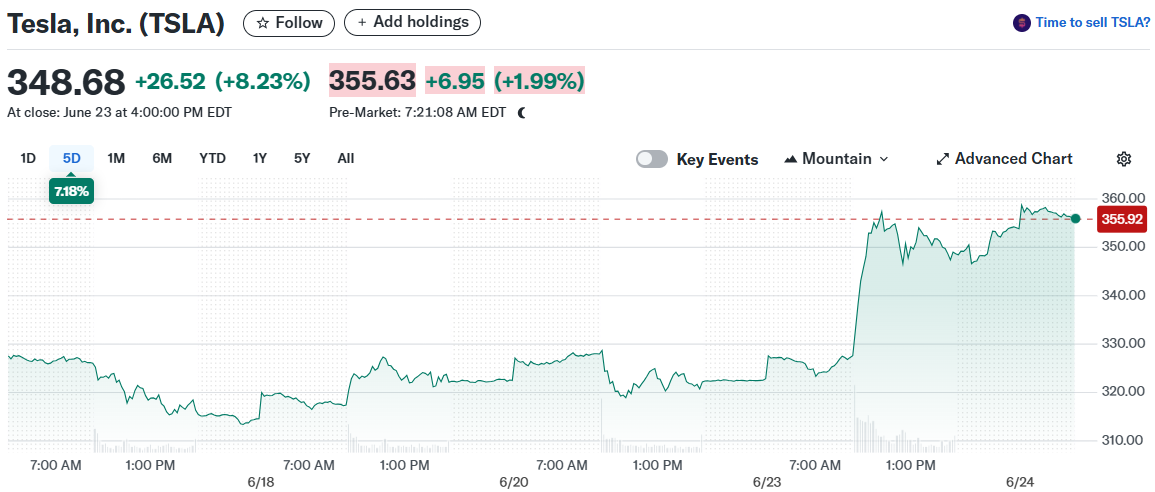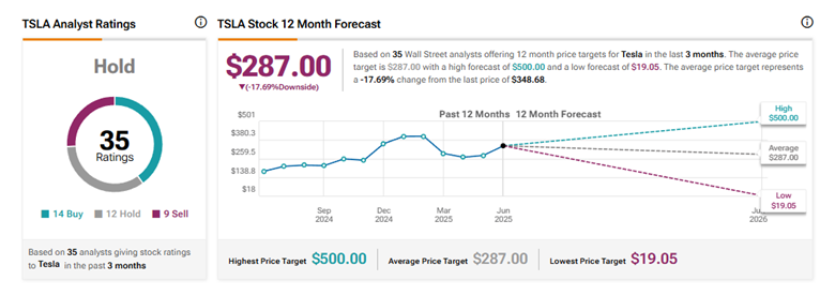TLDR
- Tesla launched its robotaxi service in Austin, Texas, charging $4.20 per ride with positive initial reviews but some technical issues emerged
- Tesla stock jumped 8.2% Monday and continued rising 2.6% in premarket trading Tuesday to $357.72
- UBS raised Tesla’s price target from $190 to $235 but maintained a Sell rating, warning current valuation already reflects high expectations
- UBS estimates Tesla could operate 2.3 million robotaxis by 2040, generating $200 billion annually and valuing the robotaxi business at $99 per share
- Alphabet’s Waymo currently completes 250,000 self-driving rides daily with an 80% reduction in injury-causing crashes, setting a safety benchmark
Tesla stock extended its rally Tuesday after launching its first robotaxi service in Austin over the weekend. The electric vehicle maker’s shares gained 2.6% in premarket trading to $357.72 following Monday’s 8.2% jump.

The company started its self-driving cab service Sunday afternoon in Austin, Texas, as planned. Tesla charged handpicked riders a flat fee of $4.20 per ride for the pilot program.
Videos on social media showed impressed passengers giving positive reviews of their robotaxi experiences. The initial feedback appeared encouraging for Tesla’s autonomous driving ambitions.
However, some technical problems surfaced as more footage emerged. One video posted by Rob Maurer showed a Tesla vehicle slightly exceeding the speed limit in a 35-mph zone.
Here’s my entire first Tesla Robotaxi trip from start to finish. Ten miles across south Austin. Timestamps in comments. pic.twitter.com/cr6y4z1UWB
— Rob Maurer (@TeslaPodcast) June 22, 2025
The same vehicle struggled with a left turn, briefly ending up in the oncoming traffic lane for several seconds. No approaching cars were present during the incident.
Edward Jones analyst Jeff Windau acknowledged the error but noted it’s part of the learning process. He expects some type of accident will eventually occur, whether Tesla’s fault or not.
Windau rates Tesla shares Hold and doesn’t have a price target on the stock. He said it will take time to see how Tesla’s safety record develops.
Performance Benchmark Set by Waymo
Alphabet’s Waymo provides a useful comparison for Tesla’s robotaxi ambitions. The Google subsidiary completes more than 250,000 self-driving taxi rides daily.
Waymo reports roughly 80% fewer injury-causing crashes compared to human drivers. That translates to 223 fewer crash events, according to the company.
This safety level has allowed Waymo to operate smoothly and serves as a benchmark for investors tracking Tesla’s progress. The standard for self-driving car safety remains under debate.
Battle Road Research analyst Ben Rose called Tesla’s launch “the first inning” using a baseball analogy. He said Tesla put “a run up on the scoreboard” with its Austin debut.
Rose estimates Waymo’s annual revenue approaches $260 million from completing 250,000 rides weekly. He doesn’t expect Waymo’s service is profitable yet at current scale.
A successful robotaxi business requires more scale with additional vehicles serving more passengers. Both Tesla and Waymo face scaling challenges ahead.
UBS Raises Price Target But Maintains Caution
UBS raised its Tesla price target from $190 to $235 following the robotaxi launch. The investment bank maintained its Sell rating on the stock.
UBS believes Tesla’s current valuation already reflects high investor expectations for autonomy and future technologies. The bank sees the robotaxi market as a long-term opportunity if Tesla executes properly.
The firm estimates Tesla could operate 2.3 million robotaxis by 2040. This fleet could generate approximately $200 billion in annual revenue.
UBS values the robotaxi business alone at $99 per share. This valuation is now incorporated into the bank’s updated Tesla model.
Despite raising the price target, UBS remains cautious about Tesla’s valuation. The bank believes the stock stays fully valued even after factoring in robotaxi and humanoid robot potential.

Tesla trades at a $1.14 trillion market cap with a price-to-earnings ratio of 181. UBS notes this valuation leaves little room for execution errors.
The investment bank recognizes Elon Musk’s focus on autonomy and robotics as key Tesla growth drivers. However, UBS highlights execution risks and regulatory hurdles ahead.
UBS is taking a reserved approach while investor sentiment turns bullish on Tesla’s AI and autonomous capabilities. The firm examines fundamentals rather than following market enthusiasm.
Tesla shares have risen more than 90% over the past 12 months despite remaining lower year-to-date. The robotaxi launch represents a key milestone in Tesla’s autonomous driving timeline.






